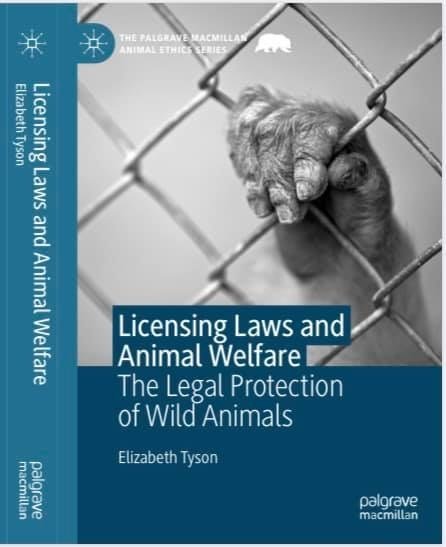Laws are Failing Wild Animals, Claims Newly Published Research

WASHINGTON: Licensing Laws and Animal Welfare: The Welfare of Wild Animals (Palgrave MacMillan and Springer Nature), a new book by Dr. Liz Tyson of Born Free USA, calls for reform in the way animal welfare is regulated, arguing that current legislative approaches prioritize the needs of industries that exploit animals over and above the needs of the animals themselves.
"If we are genuinely concerned about the welfare of wild animals, outlawing their keeping in captivity is the only way to ensure that their needs are meaningfully met," Tyson writes.
In her new book, Dr. Liz Tyson, programs director of Born Free USA, argues that current approaches to regulating animal welfare prioritize industries that exploit animals over the animals themselves.
While the research in Licensing Laws and Animal Welfare focuses largely on the regulation of zoos in Tyson's native England, she says that the findings are applicable globally. Her work discovered that zoos in England, a country which prides itself on its progressive animal welfare laws, were found to have breached relevant laws on almost 2,000 occasions during the study period between 2008 and 2019. Despite this, only 18 instances of correct enforcement action were carried out by government officials. A similar model of licensing is used to regulate zoos in the U.S., and Tyson says similar issues can likely be found stateside.
Tyson highlights the weaknesses in using licensing systems to assess and ensure animal welfare, arguing that inspections are frequently little more than a rubber-stamping exercise. Some inspections intended to establish the level of care provided to thousands of animals are carried out over a single working day, or less.
"Laws that are, ostensibly, designed to protect animals invariably contain caveats, which allow for their continued exploitation," Tyson said. "Animals are rarely truly protected, whether that be due to exemptions such as those in the U.S. Animal Welfare Act, which simply omit entire species of animal, such as mice and birds used in research, as well as farmed animals, from their oversight, or those such as the U.K.'s overarching animal welfare law, which explicitly allows practices such as chopping off birds' beaks or parts of their wings without the use of anesthesia."
Tyson argues that, if society is serious about protecting animals, laws must be designed with the specific needs of those animals in mind, rather than the current model of molding legislation around the needs of the industries that use animals. She warns that, if we were to approach regulation of animal welfare in this way, it is likely that we would have to accept that many, if not all, species of wild animals cannot be held captive and have their welfare needs met.
"Wild animals have not been domesticated over millennia in the same way that, for example, dogs have," Tyson said. "As such, they are genetically unchanged from their free-living cousins. When kept in captivity, it is impossible for all, and sometimes any, of their welfare needs to be met. I believe our lawmakers should be pioneering approaches which move away from the principle of animals as 'commodities,' towards considering them as individuals with needs which matter, and regulating for their protection accordingly."
"The plight of wild animals in captivity is at the very heart of our work at Born Free USA," said Angela Grimes, CEO of Born Free USA. "We are very pleased to have Dr. Tyson leading our programs to protect wildlife and applying her research to campaigning against captivity in the U.S. We congratulate her on this wonderful achievement."















































